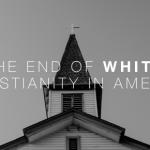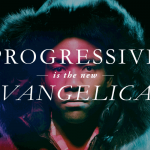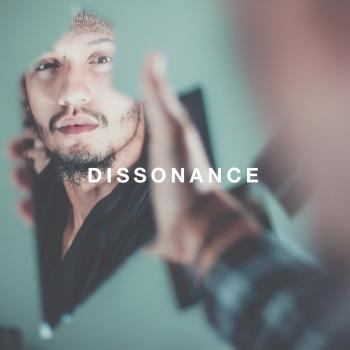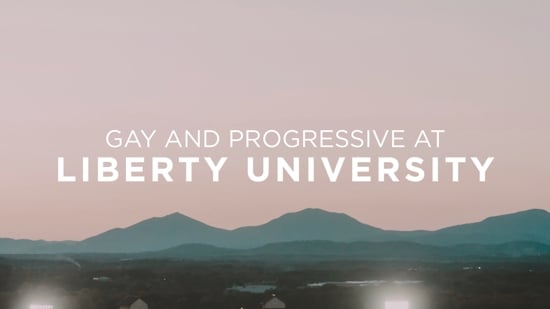
As all of this was happening, an internal war was being waged over my sexuality. By way of a thoughtfully composed blog-turned-letter that fall, I had acknowledged to my family my “struggles with same-sex attraction”. This was a form of coming out, though it made clear I was not affirming myself as a gay man. It offered the vague but hopeful assertion I could have a future relationship with a woman.
As you may already know, this internal tension between what I believed and what I was experiencing began to rip me apart, plunging me into one of the most difficult seasons of my life. As the spring of 2016 dragged on with a sizable serving of emotional volatility, I became the saddest I had ever been, certainly a first brush with what had hitherto been a foreign concept: depression. Thanks to a recent heartbreak, no longer was the abstract idea of lifelong loneliness a mild source of discontent in me; it was now at the forefront of my mind, forcing me to confront the devastating reality that my theology and that of my community would never allow me the freedom to be with a man I truly loved.
For a time, I found solace in the words of fellow gay Christians who had committed themselves to celibacy. As you may already know, this wouldn’t last.
I also found my community at Liberty to be wonderful in providing some reprieve from my struggles. Friends embraced me, prayed for me, listened to me process my feelings, and supported me through a genuinely dark time. I had become more politically progressive, engaging in fun and sometimes difficult conversations around big topics that seemed of interest to me. My emotional state at the time lent itself towards a greater empathy that would stay with me and develop my positions on a number of social and humanitarian issues.
My own fractured heart enabled me to see the damage wrought every day in the name of ideals I had never questioned.
Through my shift in paradigm, I observed the harshness of the conservatism I had known, and as it was trampled underfoot by the lunacy of the 2016 Presidential Campaign, I saw the tribalism surrounding me as symptomatic of deeper systemic issues. I perceived the tendency towards a lack of Christ-likeness in the politics of my origin, where capitalism was God’s economy and an embrace of any progressivism could lead down that slippery slope towards atheism (itself simply an extension of liberalism). Everything was grounded in and around fiscal, social, and theological conservatism.
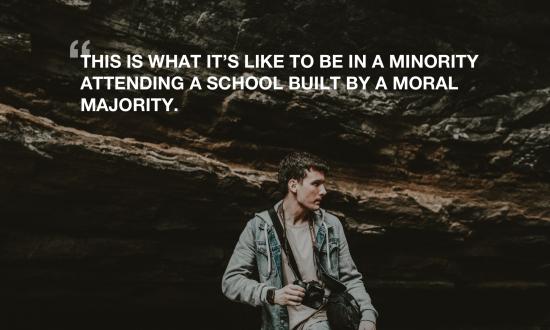
If there is anything central to the heartbeat of Liberty University, it is conservatism.
This is certainly not universally true of its students or faculty, and I would never assert that to be the case.
It was hard enough working through an ideological evolution into political progressivism in this environment. I became increasingly anxious during Convocation, frustrated with the intellectual dishonesty and rampant militant partisanship displayed on stage. Pastors spoke not just as spiritual leaders, but as political advocates. Lines were blurred and in set fatigue.
Over time, it became the platform from which my humanity and beliefs were routinely attacked.
Yet this period of my life would graciously push me over the ledge into self-affirmation of my sexuality – suddenly the loneliness I had once experienced became a very different form of loneliness. Only this time, it wasn’t for fear of never finding companionship: it was the fear of being cast out and rejected by my community for who I am and what I believe, compounded by the understanding that I was locked into something I didn’t really want anymore.
Evangelicalism, even as a diverse array of beliefs undergirding theological and political convictions, is largely held together by individuals’ intellectual assent to a series of propositional truths. I had begun actively transgressing these core values.
The spring semester ended with me frustrated, sad, and confused.
By this point, when asked by friends and family how I liked Liberty, my response had evolved from exuberance to a restrained “I don’t like the school, but I love my friends.”
What was once the most exciting facet of my life became that which threatened to undermine everything I had hoped and dreamed; and my frustrations with my degree program, the school, and the administration only continued to fester until I reached a point of utter resentment, a sentiment since transfigured into a drive towards justice.
Graduation, while a realistic goal, was no longer a promising invitation into the future. It would be my confrontation with what I now considered a terribly misguided decision.
My degree had become a liability, and I would pay for it – in more ways than one – for the rest of my life.
I came back for the fall of my junior year, fully cognizant that I was now the black sheep of Liberty University, and I knew of no one like me.
Gay, progressive, and a post-evangelical Christian.
Once fully sold-out on the ideals and promise of evangelicalism, now jaded and disillusioned with my religion and its institutions.
Election season only hastened the disillusionment.
I watched as my school’s president defended on national television the sexual predator who would later become President of the United States. (President Falwell soon blocked me on Twitter.)
I watched as the student body embraced nationalism with more fervor than I could have ever imagined, in part thanks to the relentless activism of its dear leader.
I sat through Convocations as they increasingly became politically-charged, hosting some of the least respected names in all of “journalism” and governance.
My school became host to the parasite that is Trumpism and for the most part, the higher echelons of Liberty’s administration sat complacently by as we were married to power of the worst kind.
Thankfully, we had some brave students making noise, speaking truth to power in their ever-expanding spheres of influence. I witnessed friends participate in a protest against the administration, publicly and on social media, as many of us refused to abide in an institution partly responsible for supporting demagoguery.
I began to see the value in dissent, in living a prophetic life.
My political differences and theological convictions had taken shape, and silence was not an option.
I would have to be careful, quiet, and only when it offered to make a positive difference in my community would I give myself license to speak. I began telling close friends very slowly, having difficult, though sometimes productive, conversations. My willingness to engage in discourse notwithstanding, these conversations typically ended with the ever-painful “I love you even though we disagree on these things”.
Yet it hurt, and though I longed for optimism, the pain only grew.
It was my experience with a certain Convocation guest near the end of 2015 that best illustrates my point.
Her name was Rosaria Butterfield, a woman who had previously been an LGBTQ activist but was now a Reformed Christian activist, speaking at conferences and church gatherings on sexual ethics along with the apparent dangers of LGBTQ affirmation. In her former life, she was partnered with a woman and heavily involved with her LGBTQ community.
One friendly Reformed pastor and open-minded read through Scripture later, she was a converted believer, readily embracing her new identity as a Christian and stepping out of her old way of living.
I had seen her listed on the schedule and was increasingly anxious as the day drew near. Knowing who she was ahead of time had allowed me to brace for what was sure to be a frustrating exercise in spiritual discipline.
Though I thought myself ready, I was in no way prepared for this experience.
Ms. Butterfield is a very kind individual, wise, experienced, and highly intellectual. She communicates with a cerebral effervescence that keeps you engaged and emotionally invested. More than just a unique story, her rise to prominence in non-affirming circles is due in large part to her communication skills; presenting like a professor in any prestigious university, she spoke with dignified eloquence and thoughtful restraint.
As well-spoken as she was, no amount of syntactic complexity could cover the fundamentals of her message as she proceeded to throw LGBTQ lives under the proverbial bus in the name of “righteousness”.
So did my peers.
Sitting through her talk, I knew she was striking just the right tone and saying just the right things so as to capture the heart of the student body. Not only was she playing to the evangelical crowd’s fierce opposition to LGBTQ affirmation, but she was conveying her message in an academic, intellectual voice undergirded by strong appeals to Scripture, philosophy, and the narrative threads whose confluence weaved a moving story.
She was all but guaranteed a standing ovation.
And she got it.
Beyond the ways in which I fundamentally disagreed with Ms. Butterfield, what hurt most was not what she had to say – it was seeing thousands my peers rise collectively to applaud this theology that continues to cost real lives as it denies humanity, elevates abstract platitudes over and above its tangibly dangerous implications, and promulgates a culture war whose victims are not on a side, but needlessly suffering in the middle.
I watched as almost every human being in the room stood to celebrate that which was not only a pedantic argument but a traumatizing ideal imposed upon those to whom it was addressed, those already reckoning with intense marginalization.
Me.
They clapped as I bled.
I remember the overwhelming sense of grief, the kind that reduces a person into a fragile shell. Following Convocation and imbalanced discourse with some friends over lunch, I walked briskly back to my dorm, both livid and distressed by the way in which the day had unfolded. My social media feeds were filled with posts from friends and fellow Liberty students lavishing praise upon Ms. Butterfield, reposting links to clips and the live feed.
My emotional state translated any single post past which I scrolled into an emotional uppercut, amplifying my pain in orders of magnitude.
Walking into my room, I angrily paced as I attempted with great futility to process my emotions.
It would take well over six months of similar experiences and exposure to the proper language for me to possess a vocabulary capable of describing what I felt: spiritual trauma.
I walked into my closet and sat on the floor.
I cried.
I prayed.
I breathed.
I tried to find some light in the darkness.

